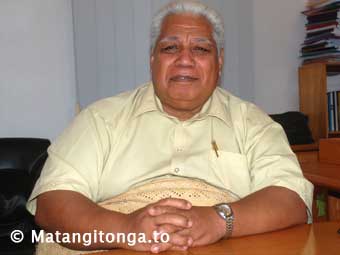
FROM OUR ARCHIVES

By Pesi Fonua
The Tongan government is looking at giving Tongan civil servants another salary rise to increase their buying power and stimulate the economy, Tonga's Minister of Finance, Hon. Afu'alo Matoto told Matangi Tonga at the end of April, when he estimated that Tonga's economic growth for the current year would not reach one per cent.
Afu'alo did not put a figure on the possible salary rise, but he stressed that a salary rise would encourage spending "and it will be good for local businesses."
He pointed out that the Australian government had adopted a similar stimulus buying scheme "by actually giving each family about $1000 a month, just to increase their buying power and keep up the demand."
But on the other hand, the Australian scheme has been challenged by an opposition member of parliament, that it failed to solve the main problem of unemployment.
Tongan public servants received a controversial 60, 70, 80% rise in 2006, but Afu'alo said that the increase was already eroding due to an increase in the price of goods.
Although, Afu'alo believed that the high price of goods will come down this year, he still believed that another salary rise was needed, and at the same time he did not anticipate any public opposition to another salary increase for civil servants.
He said the price of goods would drop because "there is a drop in the demand for oil, the price of oil goes down, and it forces down the price of food, and inflation goes down.
"The focus for Tonga is that there will be a short period of time at the end of this year or early next year when there will be no inflation and there will be a drop in the price of goods," he predicted.
Low growth
The rate of inflation may be dropping but Tonga's economic growth has plummeted.
The estimated 3% economic growth for Tonga during the 2008-09 financial year has been revised, and Afu said "this year I don't think it will be even 1%, may be .5% or .8%, but by next year it could go up to 1.5% or 2%."
With the economy in such a precarious situation Afu'alo said that people were reluctant to spend their money until they can confirm that things would be better.
"Some of the loans from Australia and New Zealand Fund that was made available for the reconstruction of Nuku'alofa, as of last month (March) $3.1 million had not been used and Australia wanted to close it last month. There was a proposal to spend $1.7 million and $1.4m was left waiting to be spent. With all the Australian and New Zealand Reconstruction Funds the only loan that has been process was the Fung Shing loan, the rest they had made commitments but nothing has been done.
"The bank is waiting, and that is an indication of how business people are reluctant to invest - to spend money.
"Everything is slowing down, and investors' confidence has been affected, and everyone wants to slow down and have a good look on how they are going to repay their loans," he said.
Cash flow problem
Tonga's depressed economic growth, demonstrated that businesses have cash flow problems and their margin of profitability will drop, said Afu'alo, though he did not think that Tonga is in a recession. "Because recession means a drop in economic growth below zero. Our economic growth drops, but not into the minus."
He said that economies that are in recession are the economies of industrialized countries that are heavily relied on each others. The impact of the recession in the industrialised economies would be felt in Tonga with a drop in remittances.
"The remittances went down last year, and in December it went up but it has come down again, but not much considering that it reached $200 millions annually. It has come down to about $190 million, and it could come down to $180 million. At the same time we hope that foreign aid will not come down, in fact, it could go up if we can increase our capacity to use aid funds," he said.
Afu was hopeful that the Asian Development Bank could bring forward Tonga's allocation of $USD10 million for 2009, 2010 and 2011 under a Program Grant scheme. With a Program Grant "we are free to spend it on whatever we wanted, but ideally on infrastructure for the benefit of the people. We are looking at road construction because during the current financial year road construction was funded from local funds. In the new financial year we could use this fund for road construction."
Afu'alo sincerely believe that Tonga could use aid funds to stimulate the economy, if we can use aid efficiently and wisely.
WTO
Commenting on Tonga's WTO membership, Afu said that Tonga had not exploited the potential its WTO membership, "simply because we don't have much to trade with.
"The advantage for us is not only the free movement of goods but also of services, and labour mobility.
"The regional free trade, PICTA is good but it will still not benefit us very much because we don't have factories. What is important there is the rule of origin, which demands a 50% of original content in order for products to enter duty free."
Afu said that more or less the same condition is applied to PACER, a Free Trade agreement between Forum Island countries and Australia and New Zealand.
"But now there is a PACER Plus. Australia and New Zealand will receive the same trade exemption as is given to the European Union. In return Australia and New Zealand will help the island states with capacity building to enable these small island states to take advantage of the WTO, by providing technical and vocational training for the Pacific Island Forum countries. They believe that the PACER free trade agreement could benefit the island countries."
Afu said that the concern that government would lose its income from customs duty because of free trade is no longer relevant following the introduction of a new taxation system. He said that the No. 1 source of income for government is the consumption tax, followed by income tax, then by excise tax, then customs duty.
No bail-outs
Could the Tongan government embark on a bail-out exercise on a particular industry or sector of the economy, similar to what has been done overseas?
Afu'alo did not think so because Tonga does not have the financial resources to embark on such an exercise.
"The notion of a bail-out in industrialised countries, means that government pumps capital into banks but in Tonga's case it is different because the banks have the capital, and they have even lowered their interest rates, but people are reluctant to borrow or to spend their money until they can confirm that there will be an improvement in the state of the economy. The global financial crisis has a negative impact on the confidence of investors, and the people who want to work."
Afu predicted that we Tonga will come out of our depressed economic status either the middle or late next year. "So it is important to be wise and watch our spending, because we still have a long way to go," he said.



